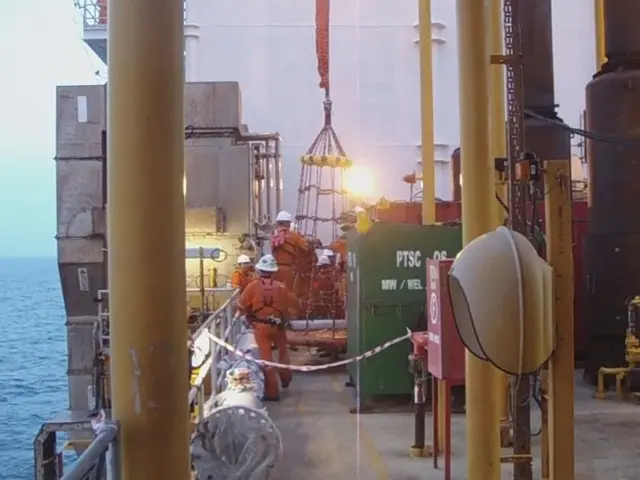Artificial intelligence sector faces potential setback as Elon Musk forewarns of impending power shortage, leading to a potential halt in the AI revolution that he describes as the "intelligence big bang."
In the rapidly evolving world of technology, the development of Artificial General Intelligence (AGI) is a hot topic that has sparked both excitement and apprehension among experts and the general public alike. The focus of current concerns and predictions revolves around three key areas: energy consumption, safety risks, and regulatory challenges.
### Energy Consumption
AGI and advanced AI systems, particularly generative AI models, are notorious for their energy intensity. These systems require vast amounts of electricity, with generative AI consuming 10 to 30 times more energy than task-specific AI. The electricity demand from AI data centers in the U.S. is projected to rise sharply, potentially reaching between 6.7% and 12% of total electricity use by 2028, with faster growth anticipated beyond that as AI adoption broadens across industries.
This escalation in energy demand raises concerns about the environmental impact and the need for sustainable energy infrastructure and clean energy supply chains to support AI’s growth. Countries like China are investing heavily in nuclear energy to meet these demands, aiming for energy security and competitive advantage in AI development. However, AI also plays a positive role in optimizing renewable energy sources such as wind, solar, and biofuels, potentially offsetting some environmental burdens.
### Safety and Geopolitical Risks
The development of AGI is seen as highly consequential and potentially dangerous, much like owning a tiger cub that may grow uncontrollably. The unaligned and unpredictable behavior of superintelligent systems is a significant worry. The democratization of AI development inputs allows a diverse array of actors—nations, corporations, individuals—to create advanced AI systems, increasing innovation but also substantially raising risks. This wide access may heighten security concerns, such as misuse of AI technologies in cyber or military contexts, and complicate control and monitoring efforts globally.
There are also worries about how AGI could affect geopolitical stability, especially given its integration with military technologies and global power dynamics.
### Regulation and Governance
Regulation of AI and AGI remains fragmented and highly politicized. The 2024 EU AI Act is the world’s first major legislation prioritizing safety over innovation speed by classifying AI systems according to risk and human rights implications. In contrast, the U.S. has favored a market-based approach that downplays regulation in favor of innovation and competitiveness, partly to maintain dominance, especially relative to China. China employs a state-led, tightly controlled framework aiming to balance societal stability with ambitions of global AI leadership.
Due to the rapid pace of AI advancement and its relevance to geopolitical competition, regulatory frameworks are struggling to keep pace, creating a "policy minefield" with significant divergences along cultural and political lines.
In summary, while AGI holds transformative potential, it also presents complex challenges around sustainability, safety, and governance that require careful, coordinated action from policymakers, industry leaders, and international stakeholders. It is crucial to address these concerns proactively to ensure that the benefits of AGI are harnessed responsibly and equitably for the betterment of humanity.
- Microsoft and other tech giants are continually updating their software, including those running on Xbox, to make AI systems more energy-efficient, as the energy consumption of these systems is a growing concern.
- In the realm of health-and-wellness, artificial intelligence could play a significant role by analyzing medical data more accurately and efficiently than human counterparts, aiding in the diagnosis and treatment of diseases.
- The future of Windows operating system might see integration with advanced AI, which could bring about a revolution in technology, but it also raises safety concerns, as uncontrolled AI could pose risks to both individuals and societies.
- The development of AGI in the science and technology sector, particularly in areas like artificial intelligence and robotics, is expected to create new jobs, but it also necessitates a considerable focus on education and training to prepare the workforce for this technology-driven future.




